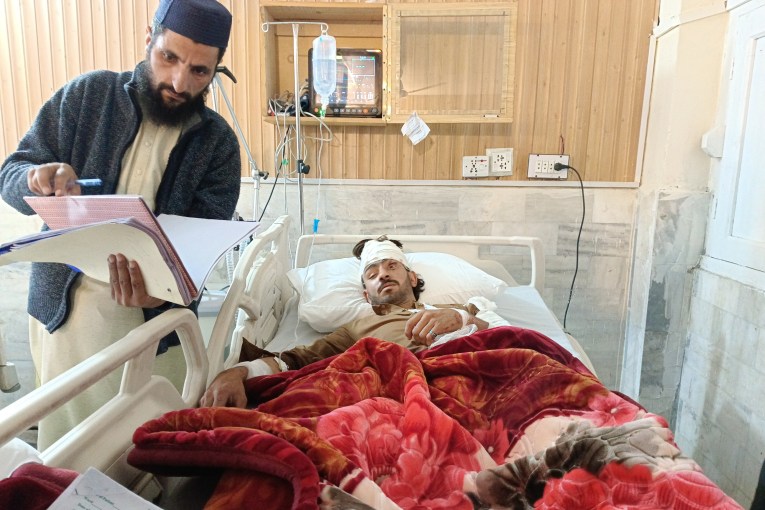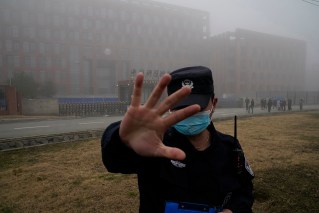‘No beds, no oxygen’: Devastating virus crisis sweeps India

A fire has broken out in a hospital in western India, killing 13 COVID-19 patients, as an extreme surge in infections leaves the nation short of medical care and oxygen.
India has recorded the world’s highest daily tally of 314,835 coronavirus infections as a devastating wave of the virus sweeps across the country.
The latest surge has already driven its fragile health systems to breaking point with understaffed hospitals overflowing with patients and critically short of supplies.
The fire at a hospital in the Virar area on the outskirts of Mumbai early on Friday occurred two days after 24 COVID-19 patients on ventilators died due to an oxygen leak in a hospital in Nashik, another city in Maharashtra state.
The fire on the second floor intensive care unit was extinguished and some patients requiring oxygen were moved to nearby hospitals, said Dilip Shah, chief executive of Vijay Vallabh hospital.
Dr Shah said 90 patients were in the hospital, about 70 kilometres north of Mumbai.
The cause of the fire was being investigated, he said.
An explosion in the air-conditioning unit of the intensive care unit preceded the fire, the Press Trust of India news agency cited state government official Vivekanand Kadam as saying.
The fire comes amid a massive surge in coronavirus cases in Maharashtra state, the worst hit in the country.
Health officials across northern and western India, including the capital Delhi said they were in crisis on Thursday, with most hospitals full and running out of oxygen.
Some doctors advised patients to stay at home while a crematorium in the eastern city of Muzaffarpur said it was being overwhelmed with bodies and grieving families had to wait their turn.
A crematorium east of Delhi built funeral pyres in its car park.
“Right now there are no beds, no oxygen. Everything else is secondary,” said Shahid Jameel, a virologist and director of the Trivedi School of Biosciences at Ashoka University.
“The infrastructure is crumbling.”
Six hospitals in Delhi had run out of oxygen, according to a tally shared by the city government, and the city’s deputy chief minister said neighbouring states were holding back supplies for their own needs.
“It might become difficult for hospitals here to save lives,” Manish Sisodia said in a televised address.
Another 2104 people died in the space of a day, taking India’s cumulative toll to 184,657, according to the health ministry data.
The previous record rise in cases was in the US, which had 297,430 new cases on one day in January. Its infection rate has since fallen sharply.
Television showed images of people with empty oxygen cylinders crowding refilling facilities, hoping to save relatives in hospital.
In the western city of Ahmedabad, a man strapped to an oxygen cylinder lay in the back of a car outside a hospital as he waited for a bed.
“Helplessness,” tweeted former foreign secretary Nirupama Menon Rao.
“India weeps.”
“We never thought a second wave would hit us so hard,” Kiran Mazumdar Shaw, executive chairman of the healthcare firm Biocon, wrote in the Economic Times.
“Complacency led to unanticipated shortages of medicines, medical supplies and hospital beds.”
Delhi Health Minister Satyendar Jain said the city needed about 5000 more intensive care beds.
Many countries, including Australia, have limited or banned flights from India as the virus has taken hold. Canada is one of the latest, banning all flights from India and neighbouring Pakistan for 30 days from Friday (Australian time).
Similar surges of infections, notably in South America, are threatening to overwhelm other health services.
China said it was willing to help India, although it was not immediately clear what this might consist of.
Meanwhile, Sweden has again extended restrictions to prevent the spread of the coronavirus as case numbers there remain high, the Prime Minister said on Thursday.
Plans to relax a cap on the number of people allowed to gather and to permit events such as concerts as of May 3 have been shelved, Prime Minister Stefan Lofven said.
Such easing will be possible only once the strain on the health-care system lessens and case numbers fall.
That means gatherings remain limited to eight people, with 20 permitted at funerals.
Restrictions on restaurants, shops and gyms are also due to remain in place, according to the health authority.
Restrictions on the number of people allowed in shopping centres, shops and gyms will also remain.
Sweden took a different route amid the pandemic, imposing relatively few restrictions and instead appealing to people to behave sensibly.
However, some tougher measures were introduced there, although still less strict than in other European countries.
Then, in mid-February, case numbers rose in Sweden and have remained at that higher level ever since.
-with AAP








